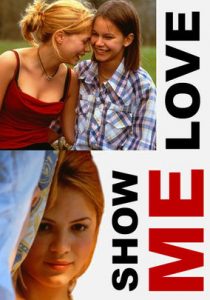Show Me Love-1998
Director Lukas Moodysson
Starring Alexandra Dahlstrom, Rebecca Liljeberg
Scott’s Review #496
Reviewed October 22, 2016
Grade: B
Throughout the latter part of the 1990s, films with more of an LGBT perspective (then simply referred to as the gay and lesbian genre) were being released more readily, though it was not until the 2000s when mainstream offerings on the subject (Monster-2003, Brokeback Mountain-2006) hit the big screen to wide acclaim.
Show Me Love (1998) is a Swedish coming-of-age story about two high school girls, opposites in social acceptance, who find love.
Interestingly, the film was directed by a male- Lukas Moodysson.
Show Me Love originally had a different title, a crude reference to the town the film is set in, in western Sweden, but when the film was considered for Academy Award contention (it did not cut), filmmakers were advised to modify the title for the film to have any shot.
The film contains a grainy look- using handheld cameras in parts and, of course, is in the Swedish language.
Agnes is sullen, introverted, and brooding. Known throughout the high school hallways as the angry, weird lesbian, she has few friends, and the ones who are kind to her, she shuns away.
Elin, by contrast, is popular, lively, and charming- everybody loves her. However, Elin is restless in the tiny Swedish town where she lives and yearns for excitement. When Agnes develops a crush on Elin, she confesses all to her computer, but nobody else.
The film is nicely put together and given the time of 1998, is quite brave. Today, many years have passed and progress within the LGBT community made, a film like Show Me Love is a more common occurrence.
Director, Moodysson, does not go for anything gratuitous or steamy but rather spins a sweet coming-of-age tale, not only of teen love and hormones but of outcasts and feelings of loneliness.
It’s a film that most can relate to in some way.
The actresses portraying the leads (Dahlstrom and Liljeberg) are fantastic in their roles and play the parts with conviction and believability. Despite being opposites, we buy their attraction and chemistry. Nothing is forced or dishonest.
My favorite scenes are the awkward 16th birthday party for Agnes, thrown by her well-meaning yet clueless parents. When nobody except a handicapped girl shows up, Agnes viciously insults her, causing her to leave.
The family sits in the living room eating the food that was planned for anticipated guests. It’s a poignant moment and rather sweet. Despite Agnes’s unpopularity at school, she has a very strong, loyal family unit- that is nice to see.
Later, Elin and her sister attend the party, but more as an excuse to avoid another one. Finally, Elin and Agnes share a kiss, but is it a mean dare or is it authentic?
A clever aspect of the film is how Moodysson distinguishes both Elin and Agnes’s sexuality. Agnes is gay, open, and out. Elin is very different and has boys interested in her.
The girls could not be more different and this adds a layer of complexity as each is in a different place in self-discovery. This feature also makes Show Me Love very honest in its storytelling.
The film is not a masterpiece and could have dared to venture into more controversial territory. Could they be harmed for being lesbians given the town they live in? Why is Agnes so sullen?
This is a stereotype (the brooding lesbian) that needs to be changed- though, given the time of the film, I will give it a slight pass. Why not make Agnes a happy, cheerful girl who is gay? How will Elin’s sister deal with Elin’s sexuality or is it merely a phase for her?
All sorts of darker issues might have been explored, but Show Me Love (1998) is tender, sweet, and lighter fare, but still an adventurous offering.
